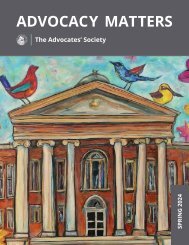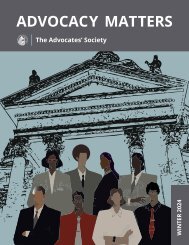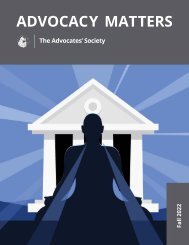Keeping Tabs - Winter 2022
Stay up-to-date on news and events from our Young Advocates' Standing Committee (YASC) with Keeping Tabs.
Stay up-to-date on news and events from our Young Advocates' Standing Committee (YASC) with Keeping Tabs.
You also want an ePaper? Increase the reach of your titles
YUMPU automatically turns print PDFs into web optimized ePapers that Google loves.
and drive to prioritize motherhood have led to<br />
heightened financial challenges.<br />
As I reflect on the pandemic’s disproportionate<br />
impact on working mothers, I am thankful for Justice<br />
Abella’s reasons in Fraser. Professor Jonnette<br />
Watson Hamilton has identified Fraser as the first<br />
successful adverse effects claim on the basis of<br />
sex. While it will not eradicate the impact of the<br />
pandemic, it provides teeth for challenging state<br />
action and laws (and perhaps, workplace policies)<br />
that further this existing and historical disadvantage.<br />
Fraser is a strong judicial statement<br />
on how Charter values can and should operate<br />
to promote equality for women.<br />
My background in global health has taught me<br />
that law is only part of the equation when advocating<br />
for change – action needs to start in the<br />
community. To conclude, I would like to share<br />
some thoughts on how we can rally together to<br />
espouse the values in Fraser:<br />
What Justice Abella could not have anticipated<br />
when she sat for the hearing of Fraser in December<br />
2019, was how poignant her observations<br />
would be in the wake of the COVID-19 pandemic.<br />
Almost two years after the pandemic started,<br />
her observations continue to ring true.<br />
The pandemic was accompanied by closed<br />
schools and daycares. Jobs were paused or lost<br />
where social distancing was not possible or the<br />
service was deemed non-essential. Based on<br />
data from Statistics Canada reported on by RBC<br />
Economics, women who are mothers, lower income,<br />
visible minorities and immigrants have<br />
faced greater rates of unemployment compared<br />
to fathers and women without children, women<br />
with higher incomes, non-visible minority women,<br />
and non-immigrant women, respectively.<br />
This disproportionate impact on women<br />
has been dubbed the “she-cession” by Prime<br />
Minister Trudeau.<br />
I have seen how members of my own Filipino<br />
Community have experienced this phenomenon.<br />
In my network of family and friends, it has<br />
been a reality that the paused or lost jobs, reduced<br />
capacity to afford continuing education,<br />
1. Education. As many of us may work from<br />
home, we may not be exposed to the unique<br />
challenges faced by working mothers in precarious<br />
jobs or otherwise. Change starts with<br />
education and we can start by consulting<br />
sources such as this Report by the Canadian<br />
Centre for Policy Alternatives.<br />
2. Donation. If you are able, consider financially<br />
supporting mothers that are navigating the<br />
challenges of unstable work due to the pandemic<br />
via local women’s charities and shelters<br />
that support women in need and help families<br />
buy essential items.<br />
3. Volunteer. As questions about employment<br />
rights arise, one way to help is by volunteering<br />
with a local or provincial pro bono law organization<br />
to help navigate legal rights and protect<br />
family livelihood. See, for example, Pro Bono<br />
Canada to locate a pro bono program near you.<br />
4. Internal Advocacy. Consider the employment<br />
practices in your own law firm to ensure sensitivity<br />
and flexibility around the pressures faced<br />
by working mothers.<br />
9


















